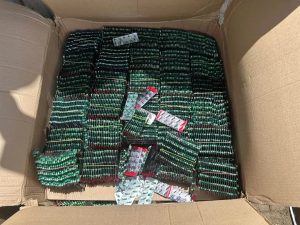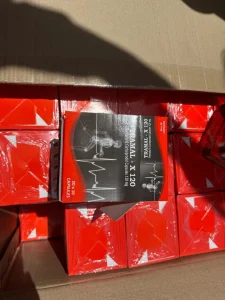The Narcotics Control Commission (NACOC), in collaboration with Customs officials at the Tema Port, has seized a massive consignment of over 118,000 capsules of high-strength Tramadol hidden inside a 20-foot shipping container.
The intercepted shipment—marked as general cargo—contained ninety-nine (99) cartons of TRAMAL-X120, a formulation made up of 120mg of Tramadol and Carisoprodol, both classified as controlled substances in Ghana. The legal limit for Tramadol in the country is 100mg per capsule.
Each carton is estimated to contain 1,200 capsules, bringing the total quantity to 118,800 capsules, far exceeding the legal dosage and volume allowed for import.
The seizure took place at approximately 4:40 p.m. during routine container checks at the Tema Port. Upon unstuffing the container, security personnel discovered the cartons concealed among bundles of sisal fibre—believed to have been used to mask the illegal shipment.

Ghana’s drug regulations only permit Tramadol products with a maximum strength of 100 mg, making the cargo a violation of national pharmaceutical laws. The container also contained sisal fibre, which authorities believe was used to disguise the illicit contents.
The bust was triggered during a routine container inspection where inconsistencies were detected. Upon unstuffing the container, the hidden controlled substances were discovered, confirming suspicions of an attempt to smuggle high-dosage Tramadol into the country under the guise of general cargo.
NACOC officials say the interception forms part of a broader, intensified campaign to disrupt the illegal drug supply chain in Ghana.

The Tema seizure comes on the heels of a major raid conducted earlier on May 7 in Atimpoku in the Eastern Region, which saw the arrest of three individuals believed to be leaders of a drug trafficking ring.
That operation, carried out after weeks of surveillance, targeted multiple hideouts and led to the confiscation of suspected narcotic substances.
Officers also discovered packaging materials and processing tools, strongly indicating that the locations were active drug distribution hubs.
While the identities of the suspects from the Atimpoku raid remain confidential due to ongoing investigations, officials disclosed that the individuals have long been under watch due to their suspected ties to regional narcotics trade.
Authorities believe the two operations may be linked as part of a wider effort to monitor the entry and distribution of controlled substances through both sea and land routes.
The three suspects from the May raid are currently in custody and assisting security agencies.
Laboratory analysis is underway to confirm the nature and potency of the seized materials, after which formal charges are expected.